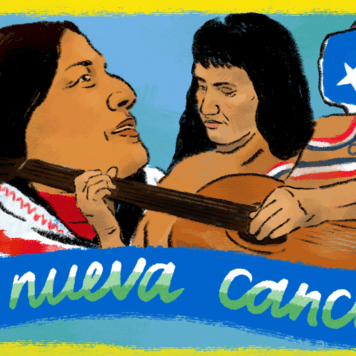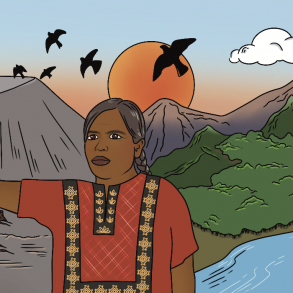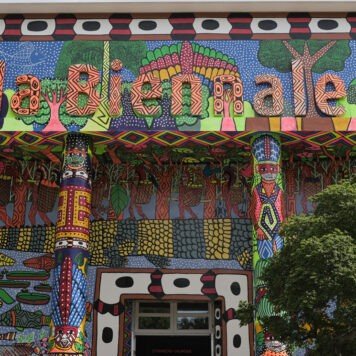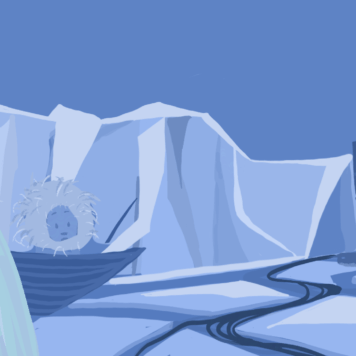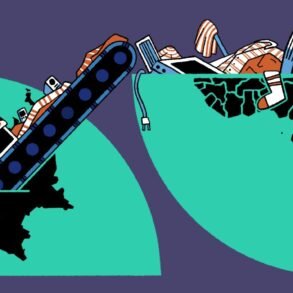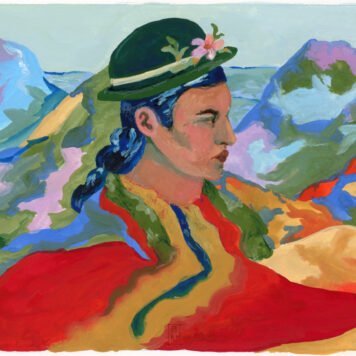I grew up as an extension of my Napu Kichwa community, the Napo River, and the Amazon rainforest surrounding it.
Our grandparents believed that the forest would continue to thrive as long as we maintained a healthy relationship with it and its beings. But they could not have foreseen the modern world’s devastating plans for it.
Although our ancestors could not predict the full scale of the harm to come, they weren’t ignorant of the changes happening around them. Indeed, they knew suffering too well, following the tragedies of colonialism. As a people, we were thrown into the era of globalisation, where both our bodies and the Earth were treated as resources to be exploited.
When I was a young child, there were days when I’d watch earthworms digging through the soil, creating tunnels for plant roots. These seemingly insignificant creatures were key to the health of our rainforest home, bringing in oxygen and draining water, leaving the earth richer than before.
But then, large machinery entered our communities for the first time, disrupting our ways of life. Soon, the tunnels of earthworms were replaced by new tunnels: pipelines all over the uplifted earth and along newly built roads. As a child I did not fully comprehend what was happening, but I knew I didn’t like it. My childhood playground, along with the trees and creatures I observed, were no longer there.
About two years later, the road was finally finished and paved. That same day I came face to face with the first car I’d ever seen on this new road. The result was a twisted arm, a missing tooth, and a pool of red blood.
I realised then that the roads were not meant for me or my community, and with time I put the pieces of the puzzle together – these roads were meant for oil.
A destructive rush for gold
The oil industry precipitated more forms of extraction. Over the next 20 years, more roads were built, communities began to divide, and a gold rush erupted. Today, oil pipelines run under roads that follow meandering rivers and cut straight through our community. Our home river, which was once clean enough to drink from, has been contaminated by gold and mineral mining.
Let me be clear: my mother panned for gold, and my aunts and uncles were taken care of by the gold that my grandmother, mother and sisters panned. In earlier days, gold sent my uncles to school and was a means to buy material things that the forest could not give but were needed in this shifting world.
But my home, the Napo Province, now has the highest number of mining concessions of any northern Ecuadorian Amazon province. It’s been more than two decades since larger machinery began to operate in our rivers – used not by us, but by outsiders. Mining currently occupies the fourth-largest sector of the Ecuadorian economy and is expected to become the third-largest export by 2025, to countries like China, Switzerland and the United States.
Because of precarious economic conditions created by the COVID-19 pandemic, we’ve recently experienced the Napo Gold Rush. From October 2021 to February 2022, miners illegally excavated and deforested over 500 acres of primary forest, beaches, and islands.
The primary benefactors were those financing it, which most likely involved “organised crime groups, wealthy local elites, and corrupt government officials.” Those who least benefited were the Indigenous Kichwa peoples, and especially downriver communities like mine who faced further contamination of our home river, our source of life.
A generational fight
Our home is abundant with gold, but that doesn’t mean it should be exploited. And in the absence of our protection, the thousands of acres of primary rainforest that we currently live alongside will become vulnerable to further exploitation.
In a recent discussion about extractivism, Maribel Cerda, President of Santu Urku Kichwa Community, expressed her disappointment in our local government. “Our community has been forgotten,” she lamented. It is true.
Delia Andi, President of Venecia Derecha Kichwa Community added: “We once let miners come into our community. They promised us jobs and a better life, but all we were left with was a large gas spill which was never cleaned up. Now they want to enter again, from experience we know it’s a bad idea. We won’t let them in again.”
The Ecuadorian government says the country must extract oil and minerals for its economic survival – but what about our survival? All we see is the destruction of Indigenous territories.
For far too long, the world has listened to stories told about us, not by us. Decisions have been made about our home without the consent or inclusion of Indigenous peoples of the Amazon Rainforest.
But our stories matter, and they are making a difference.
August 2023 was a historic month for my community and the Ecuadorian people. On the same day as the general election, there was to be a referendum on whether to halt drilling at the Yasuní Ishpingo-Tambococha-Tiputini oilfield, which is within Yasuni National Park, one of the most biodiverse places on earth.
For the first time in history, a nation put the power to decide in the hands of its people, when Ecuador gave its citizens the choice to protect the crucial ecosystems of Yasuni National Park and the Chocó Andino, a UNESCO Biosphere Reserve.
Subscribe to shado's weekly newsletter
Exclusive event news, job and creative opportunities, first access to tickets and – just in case you missed them – our picks of the week, from inside shado and out.

But, on 9 August 2023, well-renowned activist and Ecuadorian presidential candidate Fernando Villavicencio was assassinated, leaving our country heartbroken, scared, and with massive distrust. A few hours after the assassination, a gang claimed his death. Many of us were left in a state of shock and confusion, with hope decreasing by the day.
Then, on 20 August, Ecuadorians showed up to the polls. A day later, the results were announced: Ecuador became the first nation to limit fossil-fuel extraction through a democratic vote!
It must be understood that this didn’t happen overnight. The Ecuadorian government didn’t suddenly decide to take action in a moment of clarity. It is in fact the result of generations of Indigenous peoples, collectives and youth movements fighting to place the referendum on the ballot for public vote, and organising to protect Yasuni National Park.
Some of the mind-bending questions that many Ecuadorians now have are: What alternatives exist that can match the profitability of oil? Will Indigenous peoples and local communities bear the burden of the shift towards green technologies?
As a Kichwa woman, I don’t trust the government to provide us with just solutions, but I do have faith in the people, in Ecuadorian citizens, and especially in emerging youth leaders from Indigenous communities. Solutions exist within co-imagination, co-creation and collaboration. I’ve seen what is possible when passionate people come together.
The land is alive
There is no single word for ‘nature’ in our language; rather, an understanding that humans are a part of the natural world. Language is key to identity, one that surpasses our physical bodies, attempting to reveal the intimate, deep-rooted and entangled relationships we share with the land and all forest species — species related to us through a web of kinship.
“The forest is alive” is a phrase often said by our elders in the Ecuadorian Amazon. As our elders and forests pass, our way of life becomes threatened.
We drink bitter plants to be more like the forest, to embody its strength, wisdom and medicine. We cover our bodies with manduru, a bright red paint, acknowledging the forest’s presence and asking for protection. We sing songs to remember our elders, to awaken networks of forest paths and rivers.
Land is not a commodity to be owned. It is vibrant, alive – just as we are. Sooner or later, it will be understood by all – our body, the Earth, is not to be exploited. Oil is to be kept in the ground, and gold is to be left within rivers to shine along with the sunrise.



